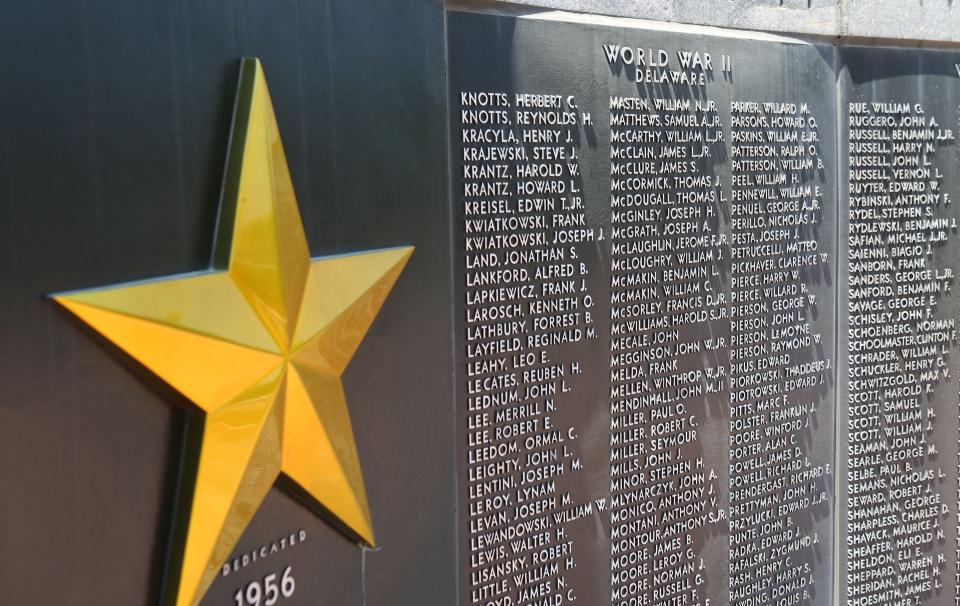As World War II veterans fade, we salute them with gratitude | Opinion
Earlier this month, Delaware and the nation commemorated Veterans Day. Veterans Day is a day set aside each year to acknowledge the living men and women who served in our armed forces. The living veterans date back to service in World War II, Korea, Vietnam, Desert Storm, Afghanistan and Iraq. Regardless of our own individual and personal views of those conflicts, the very least we can do is honor those who wore the uniform. Serving in a war or conflict is not the only factor that qualifies someone to be a veteran; many served overseas and at home when our nation was at peace. They deserve our gratitude as well.
The veterans of World War II are leaving us rapidly. According to the U.S. Department of Veterans Affairs, we have approximately 167,284 left among us. That total is from the 16 million who served. Some 180 World War II veterans die every day. At this rate, by 2034 they will all be gone. Thus far, approximately 400,000 have paid the ultimate sacrifice. On this Veterans Day, it is fitting to look back at who these men and women were and the indelible mark they left on the nation’s history.
World War II involved sacrifices that few families and communities were able to avoid. The U.S. was at peace on Dec. 7, 1941. Following that fateful day, the nation and the world would be forever changed. The U.S. prepared for more than a year with the first peacetime draft. Due to the isolationism of the country, the draft barely passed the House and the Senate, but the military leadership did not want to be caught flat-footed, knowing that inevitably the U.S. would be drawn in. The World War II draft was difficult to avoid. After the attack at Pearl Harbor, enlistees swelled the ranks of recruiting offices from coast to coast. Once these men were trained and equipped, the U.S. would have one of the most powerful militaries in the world.

Born in the early to mid-1920s for the most part, the World War II generation were children of the Great Depression. They witnessed firsthand the calamity of the Depression and how their parents plunged to rock bottom. Many took on jobs as kids to help feed themselves and their siblings. This left a lifelong mark. They were determined that their families would never have to experience hardship and lack if they could help it. Many Boomers can attest that their parents weren’t perfect, but they were providers.
Unlike many portrayals of the war, the sacrifices were borne by every segment of the population from Japanese-American units to Native American code talkers. Over one million African Americans served. They served a country that treated them as second classed citizens by law and by custom. The military was resistant to them even being allowed to join their ranks, but pressure from the Black Press and Civil Rights community pried those doors open. Many did not get to experience combat, but the ones that did made an oppressed people and a nation proud. The Tuskegee Airmen, the Red Ball Express, and Patton’s Panthers were just of few of the units that shined during the war. There is no Civil Rights movement in the 1950s and 1960s without the spirit of resistance that Black veterans brought back home with them after fighting Hitler overseas. Civil Rights legends such as Medgar Evers were World War II veterans.
With their husbands, sons and brothers sent overseas, women worked outside of the home for the first time. They were called “Rosie’s.” A popular poster at the time created by the famed artist Norman Rockwell immortalized them. They worked in the shipyards and factory floors, churning out the weapons needed to supply victory. Black women left cotton fields and kitchens to work in the defense industry. In many cases tripling the poverty wages that was their prior experience. They left the South by the thousands accelerating the Great Migration.
These men and women were a mosaic of America, and the country needed full participation to harness the might of the United States to contribute to the Allied victory. As they approach the 100-year old mark, it is fitting to remember the sacrifices these men and women made, and how many of them worked to make this country a better place when they returned. We owe them a debt of gratitude.
Dante R. Brizill is the author of three historical books about the contributions of Blacks in World War II that are part of a series entitled “Greatness Under Fire.” He resides with his family in Townsend and is a history teacher at POLYTECH High School in Woodside.

This article originally appeared on Delaware News Journal: As World War II veterans fade, we salute them with gratitude

